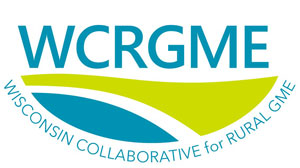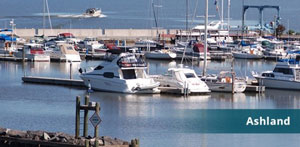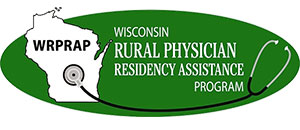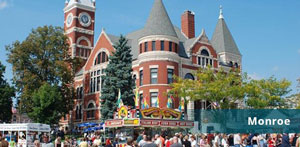Wisconsin Collaborative for Rural Graduate Medical Education
- Need: Primary care physicians in the rural areas of Wisconsin.
- Intervention: A GME collaborative and technical assistance center that provides leadership, GME expertise, and support for expanding rural graduate medical education in Wisconsin.
- Results: The collaborative expanded rural graduate medical education opportunities which now include over 30 rural-focused residency programs. There are several GME opportunities in specialties ranging from family medicine to surgery, obstetrics/gynecology, psychiatry, internal medicine and more.
Description
 The
Wisconsin Collaborative
for Rural Graduate Medical Education (WCRGME) was
created to address a critical challenge: the persistent
shortage of primary care physicians in rural communities.
Recognizing that exposure to rural practice during
residency is key to recruiting and retaining physicians
in these areas, healthcare organizations across Wisconsin
joined forces to develop rural training opportunities for
physician residents.
The
Wisconsin Collaborative
for Rural Graduate Medical Education (WCRGME) was
created to address a critical challenge: the persistent
shortage of primary care physicians in rural communities.
Recognizing that exposure to rural practice during
residency is key to recruiting and retaining physicians
in these areas, healthcare organizations across Wisconsin
joined forces to develop rural training opportunities for
physician residents.
Originally launched in 2012 as the Wisconsin Rural Training Track Collaborative, the initiative soon evolved into WCRGME. While WCRGME does not operate as a formal membership organization, it serves as a collaborative network of partners committed to strengthening rural graduate medical education (GME). What began with nine healthcare organizations from communities such as Ashland, Baraboo, and Monroe has grown into a statewide effort involving more than 60 rural hospitals, residency programs, and partner organizations.
 WCRGME provides technical assistance and
strategic support to both established programs and those
in development, helping not only to expand rural GME but
also to ensure the long-term sustainability of these
programs. Partners meet regularly via Zoom to share best
practices, address challenges, and develop collaborative
solutions. In addition, WCRGME promotes Wisconsin's rural
training opportunities through presentations and social
media campaigns to medical students both in-state and
throughout the region.
WCRGME provides technical assistance and
strategic support to both established programs and those
in development, helping not only to expand rural GME but
also to ensure the long-term sustainability of these
programs. Partners meet regularly via Zoom to share best
practices, address challenges, and develop collaborative
solutions. In addition, WCRGME promotes Wisconsin's rural
training opportunities through presentations and social
media campaigns to medical students both in-state and
throughout the region.
 The
Rural Wisconsin Health Cooperative (RWHC) spearheaded the
creation of WCRGME with a grant from the Wisconsin Rural
Physician Residency Assistance Program (WRPRAP),
funded by the state legislature through
Wisconsin Act 190 (effective July 1, 2010). The
initial grant has been renewed through 2026, with ongoing
funding anticipated into future years to sustain this
workforce initiative
The
Rural Wisconsin Health Cooperative (RWHC) spearheaded the
creation of WCRGME with a grant from the Wisconsin Rural
Physician Residency Assistance Program (WRPRAP),
funded by the state legislature through
Wisconsin Act 190 (effective July 1, 2010). The
initial grant has been renewed through 2026, with ongoing
funding anticipated into future years to sustain this
workforce initiative
Services offered
WCRGME offers the following training programs:

- 3 rural surgery programs
- 10 family medicine programs
- 3 psychiatry programs
- 3 internal medicine programs
- 2 OB/GYN programs
- 6 primary care fellowships
- 1 pediatrics program
- 1 medicine/pediatrics program
- 1 dermatology program
Additional services available:
- New program planning
- GME informational sessions
- Rural rotation site development
- Accreditation and financial planning
- Professional development for program directors and program administrators
- Faculty development
- Best practice resources
- Coordinated medical student recruitment
- Outcomes tracking and data reporting on state GME efforts
Results
- Total GME position increase of 300 once all programs achieve full complement size in 2028.
- Creation of new rural-focused programs in a wide range of specialties ranging from family medicine to general surgery to psychiatry. The state created the first OB/GYN rural track in the nation.
- Over 30 rural rotation sites established including rural hospitals, health centers, VA facilities, and tribal organizations.
- Statewide faculty development conference with attendance of over 50 rural physicians in a wide range of specialties.
- Third cohort of the GME Leadership Academy developed in partnership with the Wisconsin Northern GME Consortium (WiNC) and Medical College of Wisconsin - Central Wisconsin Campus.
- Annual statewide Medical Education Administrators and Coordinators (MEAC) workshop held to support professional development needs of program coordinators.
- Annual training opportunities for program administrators held virtually include a coordinator leadership institute, recruitment workshop, and rural administrators' fundamentals (RAFT) training.
WCRGME received the Wisconsin Rural Partners award in 2015 in recognition of being one of Wisconsin's top rural development initiatives.
Publications:
Bruksch-Meck, K., Crouse, B., Quinn, G., McCart, L., & Traxler, K. (2018). Graduate Medical Initiatives to Develop the Physician Workforce in Rural Wisconsin. Wisconsin Medical Journal, 117(5), 201-207.
Challenges
- Growing residency training in certain areas of the state remains challenging, especially in Northern Wisconsin where geographic distances can create barriers to expansion of GME.
- Medical student interest in rural training can be challenging as programs grow not only in the state, but across the nation. Engagement with a medical student advisory committee is helping WCRGME effectively promote these opportunities.
- GME funding is complicated and there are many options available to rural hospitals. Understanding of Centers for Medicare & Medicaid Services (CMS) reimbursement, hospital types, and alternative funding sources is essential in development of GME at a regional scale.
Replication
 WCRGME serves as an independent technical
assistance entity that support rural residency programs
and training sites statewide. This approach is an
emerging, replicable model that helps hospitals and other
organizations secure start-up funding while also
providing the guidance and resources needed for programs
and launch successfully and thrive long-term. By
leveraging networks among rural healthcare facilities and
traditional residency programs, WCRGME creates strong,
sustainable rural training opportunities.
WCRGME serves as an independent technical
assistance entity that support rural residency programs
and training sites statewide. This approach is an
emerging, replicable model that helps hospitals and other
organizations secure start-up funding while also
providing the guidance and resources needed for programs
and launch successfully and thrive long-term. By
leveraging networks among rural healthcare facilities and
traditional residency programs, WCRGME creates strong,
sustainable rural training opportunities.
WCRGME's Start a Rural GME Program section provides statistics, information, explanation of different versions of rural training programs, and future steps.
Contact Information
Lori Rodefeld, Director of Rural GME DevelopmentWisconsin Collaborative for Rural GME
lrodefeld@RWHC.com
Topics
Graduate medical education
· Networking and collaboration
· Physicians
States served
Wisconsin
Date added
November 15, 2012
Suggested citation: Rural Health Information Hub, 2025 . Wisconsin Collaborative for Rural Graduate Medical Education [online]. Rural Health Information Hub. Available at: https://www.ruralhealthinfo.org/project-examples/712 [Accessed 14 February 2026]
Please contact the models and innovations contact directly for the most complete and current information about this program. Summaries of models and innovations are provided by RHIhub for your convenience. The programs described are not endorsed by RHIhub or by the Federal Office of Rural Health Policy. Each rural community should consider whether a particular project or approach is a good match for their community’s needs and capacity. While it is sometimes possible to adapt program components to match your resources, keep in mind that changes to the program design may impact results.
